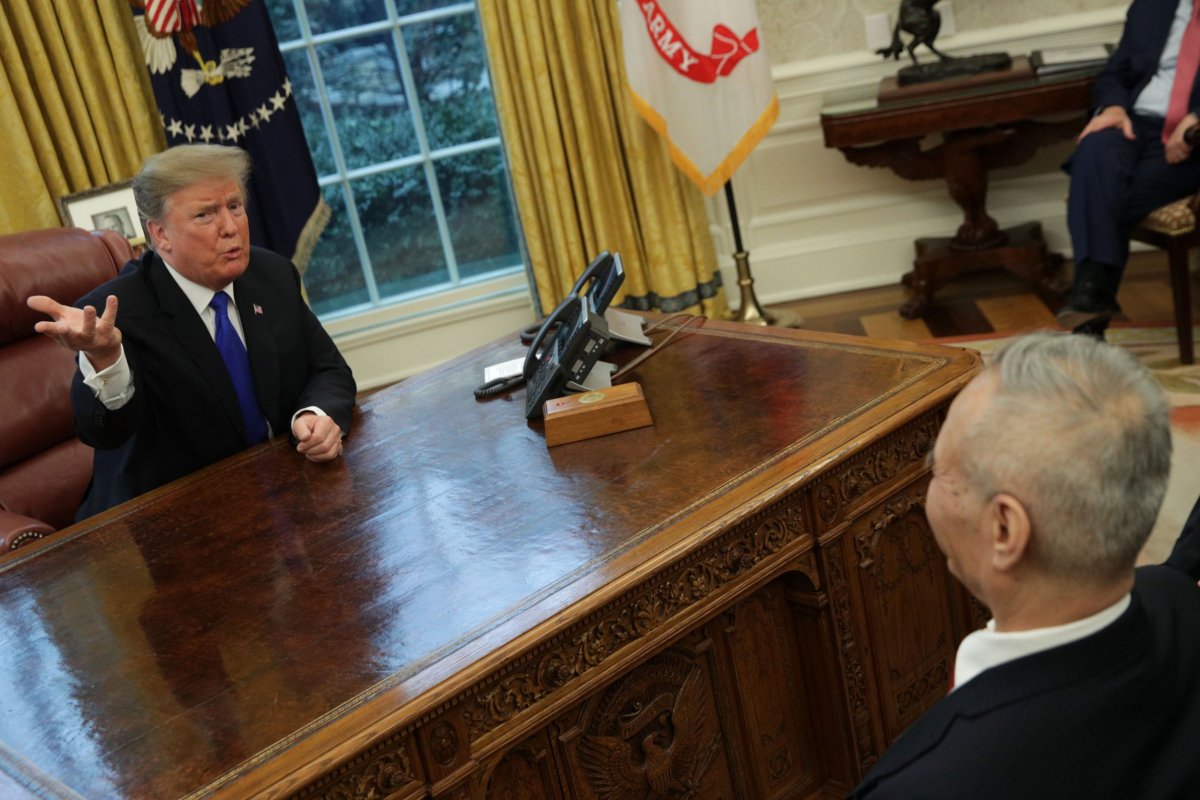Donald Trump's trade chief agreed to abandon a term he uses about a trade agreement with China after a discussion with the president turned heated in front of Beijing guests during an Oval Office meeting on Friday.
During the televised incident, Trump and U.S. Trade Representative Robert Lighthizer debated over the definition of a "memorandum of understanding" (MOU), prompting the trade chief to toss out the term altogether.
The argument started over a discussion about how long a MOU—usually a preliminary agreement between parties outlining the terms of a deal—would last in a trade deal with China.
"I think the MOU is going to be very short term. I don't like MOUs because they don't mean anything. To me, they don't mean anything," Trump asserted. "I think you're better off just going into a document."
"An MOU is a binding agreement between two people," Lighthizer replied. "And that's what we're talking about. It's detailed. It covers everything in great detail. It's a legal term... It's a contract."
"By the way I disagree," Trump interrupted. "We're doing a memorandum of understanding that will be put into a final contact, I assume. But to me, the final contract is really the thing Bob, and I think you mean that too, is really the thing that means something. A memorandum of understanding is exactly that, it's a memorandum of what our understanding is."
The president added: "The real question is, Bob... how long will it take to put that into a final binding contract?"
Finally getting Trump's message, Lighthizer abandons his attempts at gently educating the president and goes on to declare that the terminology will be replaced with "trade agreement."
"From now on, we're not using the word 'memorandum of understanding' anymore," he said. "We're going to use the term 'trade agreement'... We're never going to use MOU again."
CBS News White House correspondent Mark Knoller captured an image of Chinese Vice Premier Liu He and another Beijing official laughing at the exchange between the U.S. president and his trade representative.
Chinese Vice Premier Liu He laughs, when Pres Trump tells his Trade Rep Robert Lighthizer that he disagrees with the use of Memorandums of Understanding in trade deals. Lighthizer gets the message and says they won't use that term anymore. pic.twitter.com/GLqXUhP9uS
— Mark Knoller (@markknoller) February 22, 2019
The exchange on Friday was not the first time the president has challenged the name of a major trade agreement with a foreign country. In an attempt to rebrand the North American Free Trade Agreement (NAFTA), Trump convinced Canada and Mexico last year to allow the document to be renamed the U.S.-Mexico-Canada agreement (USMCA).
Derek Scissors, a China expert at the American Enterprise Institute, told Bloomberg that the Trump administration's decision to use MOUs was strategic.
"The Trump administration originally chose MOUs because no truly binding agreement can be made on the exchange rate or large future purchases of corn, much less technology coercion China denies has ever happened," he said.
"If the administration switches to calling it a binding trade agreement, members of Congress will want to vote on it. If they don't get to, this looks exactly like Obama not wanting Congress to vote on the Iran nuclear deal."

Uncommon Knowledge
Newsweek is committed to challenging conventional wisdom and finding connections in the search for common ground.
Newsweek is committed to challenging conventional wisdom and finding connections in the search for common ground.
About the writer
To read how Newsweek uses AI as a newsroom tool, Click here.








